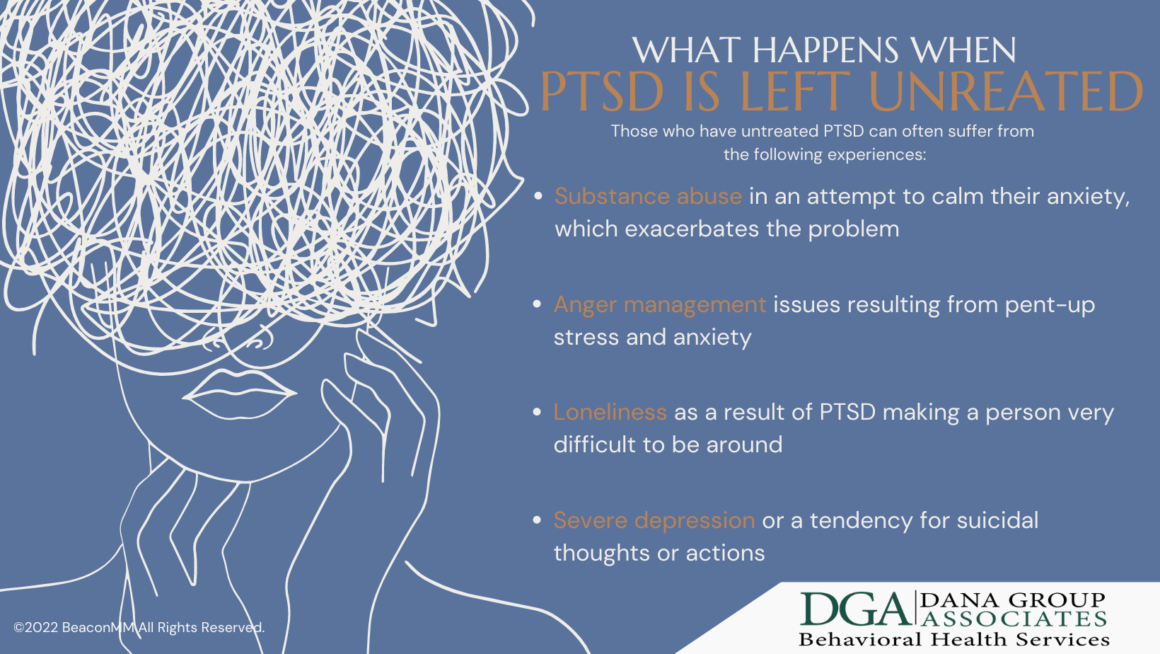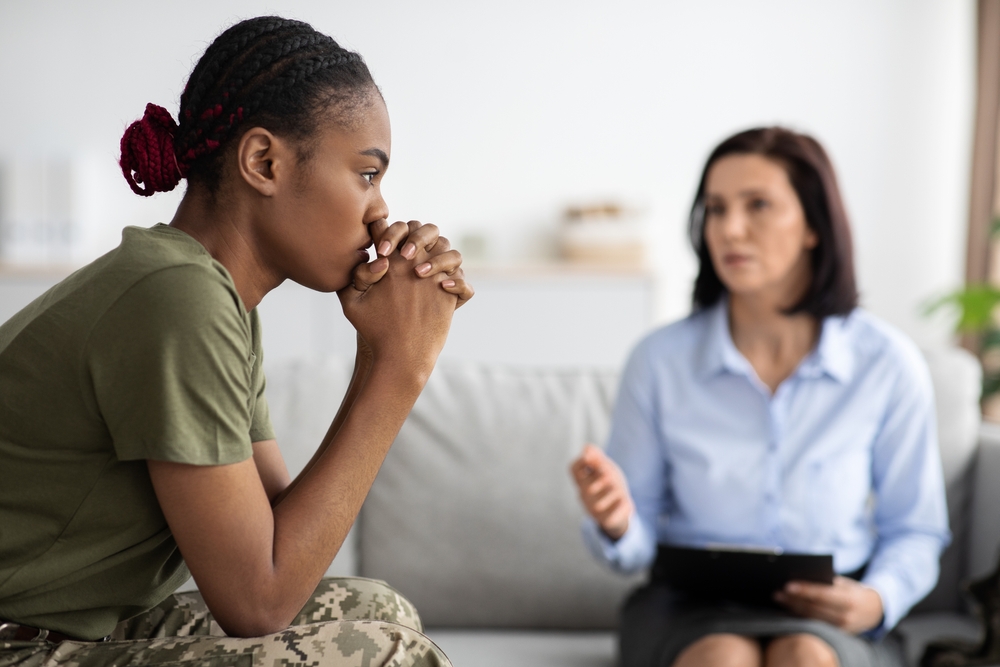Do you have or suspect you have PTSD? If so, have you ever wondered what happens when PTSD is left untreated? What you need to know is that PTSD is a progressive disease. And while you might hope that it will go away with time, it actually gets worse the longer you wait to seek help.
Untreated PTSD can lead to depression, substance abuse, or even suicide. However, we can help you avoid all those dangers. Talking to a therapist is the first step to seeking help, healing, and getting back in control of your life.
If you are concerned about the consequences of your untreated PTSD, contact us at Dana Behavioral Health to schedule an appointment.
The Dangers of Untreated PTSD

The question of what happens when PTSD is left untreated requires a thoughtful answer. When you don’t get treatment right away, troublesome consequences can begin to develop. Among people who have PTSD and have not gotten treatment, many of the following conditions and life situations happen.
- Depression – Depression can have different symptoms for each individual. You might eat or sleep too much or too little. You may feel hopeless, helpless, or feel guilty for things that weren’t your fault. One of the most important criteria for a diagnosis of depression is no longer feeling any pleasure in things you once enjoyed. Plus, PTSD can weigh you down, giving you a depressed mood.
- Suicide – Suicidal thoughts can lead to making suicide plans and attempts. If you find yourself giving away prized possessions, engaging in dangerous behavior, or driving under the influence of drugs or alcohol, these can be signs that you are vulnerable to suicide. Because PTSD revolves around a nearly unbearable trauma, it’s not surprising that some people who have it use suicide as an escape.
- Severe Anxiety – Anxiety is usually a part of post-traumatic stress disorder. However, if the PTSD is not treated, your anxiety may get more intense over time. It could get so distressing that you no longer want to leave your home.
- Substance Abuse – PTSD survivors often turn to substance abuse in hopes of comfort. You may find that your reason for drinking or using drugs is related to your PTSD. You might use substances in an attempt to dull your inner turmoil or try to stop thinking about your traumatic experience.
- Poor Performance at Work or School – It’s hard to be your best at school or work when nightmares keep you from sleeping well. Other symptoms, such as flashbacks or panic attacks, can disrupt your work significantly.
- Sexual Dysfunction – Many men with untreated PTSD have sexual dysfunction. This problem can weaken your relationships and make you feel bad about yourself.
- Relationship Issues – Your partner, family, and friends might not understand what you are going through with your PTSD. That makes relationships difficult to navigate. While they may love you, your symptoms may continue to keep you from developing the relationship in a positive way.
- Increasing Severity of PTSD Symptoms – Because untreated PTSD is a progressive disorder, it gets worse and worse day by day. If you were easily startled soon after the traumatic incident, your fear might increase dramatically over time, for example. Angry outbursts can progress into violence, and self-destructive behaviors might progress to suicide.
Fortunately, help is available. Remember, no one has treatment for PTSD before the trauma happens, and there is virtually never anyone available for help while the traumatic experience that caused the PTSD is happening. So, everyone gets help afterward. You are not alone. But reaching out now could help you avoid the consequences of untreated PTSD.
Are you ready to reach out for help with PTSD? We encourage you to reach out to us at Dana Group to take positive action now.
What Is Treatment Like for People with PTSD?
Now that you have read a bit about what happens when PTSD is left untreated, you might realize that you need to reach out for help. However, if you don’t know at all what to expect, it can add to your anxiety. Once you enter treatment, your mental health professionals will respectfully and kindly guide you through the program.
At Dana Behavioral Health, we offer several kinds of care for those who have already experienced what happens when PTSD is left untreated. We provide emotional support and evidence-based treatments to help you get back to the life you want and need.
Psychiatric Care
A psychiatrist’s job is usually focused on medication management. In other words, psychiatrists prescribe and monitor medications for people, including those who have PTSD. Our psychiatrists are proficient in recognizing PTSD and providing mental health care that makes a positive difference. As of now, several medications have been approved to help with PTSD. No one can force you to take antidepressants or other medications. However, if they can help reduce the symptoms of PTSD, you might find it’s worthwhile to consider taking them.
Psychotherapy
Psychotherapy helps you deal with the memories and distress you feel when your PTSD symptoms show up. You can learn new ways of thinking about the trauma from your therapist. Another approach is to have exposure therapy, which exposes you to similar situations, often using virtual reality systems. This therapy helps you face your fears and learn to deal with the symptoms whenever they arise. PTSD treatments include:
- Prolonged Exposure Therapy
- Cognitive Behavioral Therapy
- Cognitive processing therapy
- Eye movement and desensitization and Reprocessing
- Stress Inoculation Training
The goals of PTSD therapy are still the same, even if you have waited to seek help. The first goal is to reduce your symptoms. Next, you learn skills to cope with them when they happen. Finally, you will likely need help to get back your self-esteem. After all, when you go through a traumatic experience, you might continually wonder whether it happened because you took the wrong actions or didn’t do anything.
Other Therapies
Therapists besides your individual psychotherapist can provide evidence-based treatments for people with mental health concerns, including PTSD. For example, music therapy can give you a safe space to express your feelings or engage in a positive activity. You may go to a music therapy group or see a music therapist for individual therapy.
Since PTSD can create difficult challenges within relationships, we offer family and children’s therapy. This therapy can help you and your children come together as you work out the problems keeping you apart. Then, you can strengthen those bonds and become a tighter-knit family whose members support each other along life’s journey.
The Sooner You Get Help, the Better
We invite you to take action now to avoid the consequences of untreated PTSD. Whether you know what happens when PTSD is treated or not, you can still begin treatment to deal with the post-traumatic stress disorder as it is right now.
We encourage you to discover the therapeutic experiences you will find when you seek treatment for your PTSD. This disorder doesn’t have to take over your life. You can get help now to overcome your symptoms and build a better life and family. Whenever you are ready, we are here to help with the best treatments and appropriate care for your unique condition.
Have you discovered that time doesn’t heal all wounds? You can take action for a better life. Call us at Dana Group for expert PTSD care.
